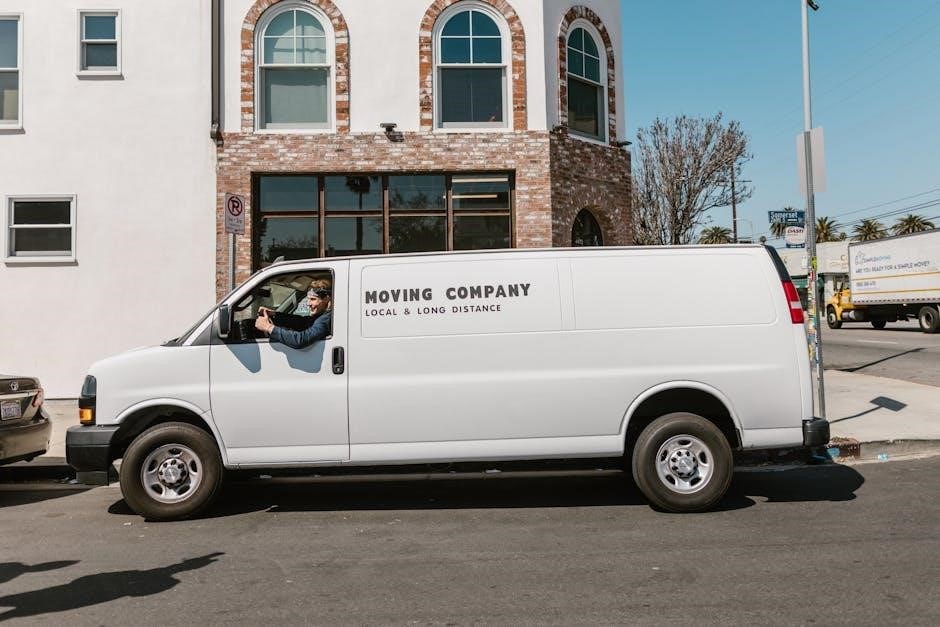The Washington State Commercial Driver Guide is a comprehensive resource outlining the laws, regulations, and requirements for obtaining and maintaining a Commercial Driver License (CDL) in Washington. It provides detailed information on eligibility criteria, application processes, and safety standards to ensure safe and efficient operation of commercial vehicles.
Overview of the CDL Program in Washington State
The Washington State CDL Program ensures that commercial drivers meet strict safety and regulatory standards. It outlines the requirements for obtaining and maintaining a Commercial Driver License (CDL), including medical exams, background checks, and skills tests. The program is designed to promote road safety, reduce accidents, and comply with federal and state regulations. It also provides a structured framework for drivers to understand their responsibilities and stay informed about updates to CDL policies in Washington State.

Types of Commercial Driver Licenses (CDLs)
The Washington State Commercial Driver Guide outlines three primary CDL types: Class A, B, and C, each tailored to specific vehicle weights and operational requirements.
Class A CDL: Requirements and Restrictions
A Class A CDL in Washington State is required for operating combination vehicles with a GVWR of 26,001 pounds or more, where the towed vehicle weighs over 10,001 pounds. Applicants must be at least 21 years old, pass a medical examination, and hold a valid Washington State driver’s license. Restrictions include prohibitions on operating vehicles without proper endorsements or violating federal and state safety regulations. This license also allows drivers to operate Class B and C vehicles with appropriate endorsements.
Class B CDL: Requirements and Restrictions
A Class B CDL in Washington State is required for operating heavy straight vehicles with a GVWR of 26,001 pounds or more, including buses and trucks. Applicants must be at least 21 years old, pass a medical exam, and hold a valid Washington State driver’s license. Restrictions include operating vehicles without proper endorsements or violating safety regulations. This license allows drivers to operate Class C vehicles with appropriate endorsements but does not permit operating Class A vehicles without additional qualifications.
Class C CDL: Requirements and Restrictions
A Class C CDL in Washington State is required for operating vehicles designed to transport 16 or more passengers, including the driver, or for hauling hazardous materials. Applicants must be at least 21 years old, pass a medical examination, and hold a valid Washington State driver’s license. Endorsements are required for transporting passengers or hazardous materials. Restrictions include operating vehicles outside the designated class or carrying hazardous materials without proper endorsements. This license is essential for specific commercial driving roles within Washington State.

Eligibility Criteria for Obtaining a CDL in Washington State
Obtaining a CDL in Washington State requires meeting specific eligibility criteria, including residency, legal status, and medical fitness, to ensure safe and qualified operation of commercial vehicles.
Age Requirements
In Washington State, the minimum age to apply for a Commercial Driver License (CDL) is 18 years old for intrastate driving, while interstate commercial driving requires applicants to be at least 21 years old. Applicants must provide proof of age and residency to meet the eligibility criteria. These age requirements ensure drivers have the necessary maturity and experience to operate commercial vehicles safely and responsibly on public roads.
Medical Examination Requirements
To obtain a Commercial Driver License (CDL) in Washington State, applicants must undergo a medical examination by a Federal Motor Carrier Safety Administration (FMCSA)-certified medical examiner. The exam evaluates vision, hearing, blood pressure, and physical condition to ensure drivers can safely operate commercial vehicles. A Medical Examiner’s Certificate is issued upon passing, valid for up to two years, depending on health conditions. This requirement ensures commercial drivers meet federal safety and health standards.
Background Checks and Disqualifications
In Washington State, CDL applicants must undergo mandatory background checks to ensure public safety. These checks review criminal history and driving records for offenses like DUIs, reckless driving, or felony convictions. Certain violations may disqualify applicants from obtaining or maintaining a CDL, either temporarily or permanently. Disqualifications can result from serious traffic offenses, drug or alcohol-related convictions, or felony charges. Applicants with disqualifications must wait the specified period before reapplying for their CDL.
Application Process for a CDL in Washington
The CDL application process in Washington involves verifying eligibility, submitting required documents, and paying applicable fees. Applicants must complete these steps to proceed with their CDL application.
Step-by-Step Guide to Applying for a CDL
- Determine eligibility based on age, residency, and medical requirements.
- Gather required documents, such as proof of identity, residency, and Social Security number.
- Complete the CDL application form, available online or at a licensing office.
- Submit the application and pay the associated fees.
- Pass the required written knowledge test(s) based on the type of CDL.
- Schedule and pass the skills test, which includes a pre-trip inspection, basic vehicle control, and on-road driving exam.
- Receive your CDL upon successful completion of all requirements.
Required Documents for CDL Application
- Proof of identity (e.g., valid U.S. passport, certified birth certificate);
- Proof of Washington State residency (e.g., utility bill, lease agreement).
- Valid Social Security card or equivalent document.
- Completed CDL application form.
- Medical Examiner’s Certificate (MEC) and Medical Examination Report (MER).
- For minors, parental or guardian consent if under 18.
These documents ensure compliance with federal and state regulations for CDL issuance.
Fees Associated with CDL Application
Obtaining a CDL in Washington State involves various fees, which cover application processing, testing, and licensing. The base application fee is typically around $110, with additional costs for endorsements such as hazardous materials or passenger transport. A skills test fee also applies, and renewal fees are required every 5 years. Fees may vary based on the type of endorsement or license duration. Applicants should verify the latest fee schedule on the Washington State Department of Licensing website for accurate information.

Written and Skills Tests for CDL
The CDL process includes a written test on traffic laws and regulations, plus a skills test assessing vehicle inspection and driving abilities to ensure competency.
Preparing for the CDL Written Test
Preparing for the CDL written test requires studying the Washington State Commercial Driver Guide, which covers traffic laws, safety regulations, and vehicle-specific knowledge. Focus on key areas such as pre-trip inspections, cargo handling, and hazardous materials. Utilize online practice tests to familiarize yourself with the question format. Understanding the material thoroughly ensures confidence and readiness for the exam.
Understanding the CDL Skills Test
The CDL skills test evaluates your ability to safely operate a commercial vehicle. It includes three sections: pre-trip inspection, basic vehicle control, and on-road driving. During the pre-trip inspection, you must identify and report any safety issues. Basic control tests your handling of the vehicle in confined spaces, while the road test assesses your driving skills in real traffic conditions.
Examiners focus on safety, adherence to traffic laws, and proper vehicle maneuvering. Practice is key to mastering these skills and ensuring a successful test outcome.
Commercial Driver Disqualifications and Restrictions
Commercial Driver Disqualifications and Restrictions involve penalties for serious offenses, such as DUI or reckless driving, leading to CDL suspension. Restrictions may limit vehicle type or endorsements, ensuring safe operation.
Common Reasons for CDL Disqualification
CDL disqualification often results from severe violations, such as DUI, reckless driving, or hitting-and-run incidents. Excessive speeding, multiple traffic offenses, and accidents involving fatalities can also lead to suspension. Additionally, failing to maintain medical certification or being convicted of drug-related offenses may result in disqualification. These violations can vary in severity, leading to temporary or permanent loss of CDL privileges, depending on the offense and prior violations.
How to Reinstate a Disqualified CDL
Reinstating a disqualified CDL in Washington requires resolving the violation that caused the disqualification. Drivers must complete any mandated penalties or courses, such as a DUI program. After serving the suspension period, they must pay reinstatement fees and apply through the Department of Licensing. In some cases, passing a CDL skills test may be necessary. Maintaining a clean driving record is essential for reinstatement. Check with the Washington State Department of Licensing for specific requirements and procedures.
Endorsements and Restrictions on a CDL
Endorsements on a CDL allow drivers to operate specific types of vehicles, such as tankers or school buses. Restrictions limit certain operations, ensuring safe and legal driving practices.
Available Endorsements for CDL Holders
CDL holders in Washington State can obtain various endorsements to expand their driving privileges. Common endorsements include H for hazardous materials, N for tank vehicles, P for passenger vehicles, S for school buses, and T for double or triple trailers. Each endorsement requires specific knowledge and skills tests, as well as background checks for certain designations, such as the H and S endorsements. These additional qualifications enable drivers to operate specialized vehicles and increase their career opportunities in the commercial driving industry.
Understanding CDL Restrictions
CDL restrictions in Washington State are limitations placed on a driver’s license based on their qualifications, vehicle type, or driving record. Common restrictions include operating only specific classes of vehicles or prohibiting the transportation of certain cargo. Violations of traffic laws, medical disqualifications, or lack of required endorsements can lead to restrictions. Drivers must adhere to these limitations to maintain their CDL privileges and ensure public safety. Understanding and complying with these restrictions is crucial for commercial drivers to operate legally and efficiently.

Vehicle Inspection and Maintenance Requirements
Regular inspections and maintenance are critical for commercial vehicles in Washington State to ensure safety and compliance with regulations. Drivers must perform pre-trip and post-trip checks, and follow established maintenance schedules to uphold vehicle integrity and prevent hazards on the road.
Pre-Trip and Post-Trip Inspection Requirements
Commercial drivers in Washington State must conduct pre-trip and post-trip inspections to ensure vehicle safety. Pre-trip checks include examining tires, brakes, lights, mirrors, and fluid levels. Post-trip inspections involve verifying all systems function properly after operation. Drivers must document these inspections, and failure to comply can result in violations. Regular inspections help prevent mechanical issues and enhance road safety, aligning with state and federal regulations for commercial vehicles.
Maintenance Requirements for Commercial Vehicles
Commercial vehicles in Washington State must adhere to strict maintenance standards to ensure safety and compliance. Regular inspections and servicing of brakes, tires, lights, and fluid levels are mandatory. Drivers and fleets are responsible for maintaining accurate records of maintenance activities. Proper vehicle upkeep helps prevent mechanical failures, reduces accidents, and ensures compliance with state and federal safety regulations. Regular maintenance is critical for operational efficiency and road safety.

Hours of Service Regulations for Commercial Drivers
Hours of Service (HOS) regulations in Washington State ensure commercial drivers operate safely by limiting driving hours and requiring mandatory rest periods to prevent fatigue.
Understanding Hours of Service Rules
Hours of Service (HOS) rules regulate the number of hours commercial drivers can operate. Drivers may drive up to 11 hours after 10 consecutive hours off-duty. A 30-minute break is required after 8 hours of driving. The 14-hour workday limit includes all on-duty activities. Weekly limits are 60/70 hours, resetting after 34 consecutive hours off-duty. These rules aim to reduce driver fatigue, enhancing road safety and productivity. Electronic logging devices (ELDs) monitor compliance, ensuring adherence to federal and state regulations.
Logging Hours of Service Electronically
Electronic Logging Devices (ELDs) automatically track driving time, ensuring compliance with Hours of Service rules. ELDs replace paper logs, reducing errors and providing accurate records. Drivers and carriers can access real-time data, streamlining inspections and reporting. ELDs synchronize with vehicle engines, recording on-duty status, driving hours, and breaks. This technology enhances safety by preventing fatigue-related accidents and ensures adherence to federal and state regulations. Proper use of ELDs is mandatory for commercial drivers in Washington State to maintain compliance and avoid penalties.

Medical Requirements for Commercial Drivers
Commercial drivers must undergo a medical examination to ensure physical and mental fitness for driving, meeting specific health criteria for safe operation of commercial vehicles.
Medical Certification Process
The medical certification process for commercial drivers involves a physical examination conducted by a FMCSA-certified medical examiner to assess fitness for driving. Drivers must provide detailed medical history and undergo tests to meet federal standards. Upon passing, a Medical Examiner’s Certificate is issued, which must be submitted to the Washington State Department of Licensing. Certification is typically valid for 1-2 years, depending on health conditions, and must be renewed to maintain CDL eligibility. Regular medical evaluations ensure ongoing compliance with safety regulations.
Understanding the Medical Examiner’s Role
The medical examiner plays a critical role in ensuring commercial drivers meet federal health standards. Certified by the FMCSA, they conduct physical exams to assess vision, hearing, blood pressure, and overall health. Their evaluation determines a driver’s fitness for operating commercial vehicles safely. The examiner’s role includes identifying any medical conditions that could impair driving ability and issuing or withholding certification based on findings. This process is essential for maintaining road safety and compliance with federal and state regulations. Their expertise ensures only qualified drivers operate commercial vehicles.

Traffic Laws and Safety Regulations
Commercial drivers in Washington must adhere to strict traffic laws and safety regulations, including speed limits, blood alcohol content restrictions, and mandatory safety inspections to ensure road safety.
Key Traffic Laws for Commercial Drivers
Commercial drivers in Washington must comply with strict traffic laws, including reduced speed limits for certain vehicles, zero-tolerance blood alcohol content (BAC) policies, and mandatory safety inspections. Specific regulations govern hours of service, load securement, and equipment standards to ensure public safety. The Federal Motor Carrier Safety Administration (FMCSA) and state authorities enforce these rules, with penalties for violations. These laws apply to semi-trucks, buses, and other commercial vehicles, emphasizing safe operation and adherence to traffic signals and signage.
Safety Regulations for Commercial Vehicles
Washington State enforces strict safety regulations for commercial vehicles to protect public safety. These include mandatory pre-trip and post-trip inspections, proper load securement, and adherence to equipment standards. Drivers must ensure all safety devices are functioning correctly, and vehicles meet state and federal inspection requirements. Regular maintenance checks are required to address potential issues before they lead to accidents. Non-compliance with these regulations can result in fines, penalties, and even temporary suspension of operating privileges, emphasizing the importance of strict adherence.
Insurance and Liability Requirements
Commercial vehicles in Washington State must meet specific liability insurance requirements to ensure financial responsibility. Policies must cover damages and injuries, protecting both the public and operators.
Insurance Requirements for Commercial Vehicles
In Washington State, commercial vehicles must carry liability insurance to cover damages or injuries. The minimum coverage varies by vehicle type and weight. Commercial drivers must maintain valid insurance policies, with coverage amounts specified by state law. Failure to comply may result in penalties, fines, or license suspension. Insurance ensures financial responsibility, protecting both drivers and the public in case of accidents or property damage. Proper documentation of insurance is required during vehicle registration and CDL renewal processes.
Understanding Liability Coverage
Liability coverage is essential for commercial drivers, protecting against damages or injuries caused to others. It typically includes bodily injury liability and property damage liability. Bodily injury coverage pays for medical expenses, pain, and suffering, while property damage covers repairs or replacement of damaged property. Washington State mandates minimum liability limits for commercial vehicles, ensuring drivers can cover potential claims. Understanding these coverages helps commercial drivers comply with legal requirements and protect their financial interests in case of accidents or incidents.

Resources and Training for CDL Holders
Washington State offers various resources and training programs to help CDL holders maintain their qualifications and stay informed about industry standards and legal requirements.
Recommended Training Programs
Washington State recommends enrolling in state-approved CDL training schools for hands-on experience. These programs cover essential skills like vehicle inspection, safety regulations, and defensive driving. Experienced instructors guide students through both classroom and behind-the-wheel training. Additionally, third-party organizations, such as the Federal Motor Carrier Safety Administration (FMCSA), offer resources to enhance knowledge and compliance. Many community colleges and technical institutes also provide specialized CDL training, ensuring drivers are well-prepared to meet industry standards and maintain public safety on the roads.
Additional Resources for Commercial Drivers
Commercial drivers in Washington State can access various resources to stay informed and compliant. The official Washington State Commercial Driver Guide provides detailed insights into regulations and best practices. Online platforms, such as the Washington State Department of Licensing website, offer updates on laws and licensing procedures. Additionally, organizations like the Federal Motor Carrier Safety Administration (FMCSA) and local trucking associations provide valuable tools, including safety guidelines and training materials. These resources help drivers maintain compliance and enhance their professional skills.

Continuing Education and Updates
Commercial drivers in Washington State must stay updated on changing regulations and safety standards through ongoing training and educational resources provided by state and federal authorities.
Staying Updated on CDL Regulations
Commercial drivers must stay informed about updates to CDL regulations, safety protocols, and licensing requirements in Washington State. Regularly check the Washington State Department of Licensing website for the latest changes. Federal regulations, such as those from the FMCSA, also apply and may be updated periodically. Drivers can subscribe to newsletters or attend workshops hosted by state agencies or professional associations to stay current. This ensures compliance and maintains public safety on the roads.
Ongoing Training for Commercial Drivers
Ongoing training is essential for commercial drivers to maintain proficiency and adapt to new regulations. Topics include defensive driving techniques, cargo handling best practices, and updates on medical certification. Regular refreshers on emergency procedures and safety protocols are also crucial. Staying updated ensures compliance with state and federal regulations, enhancing road safety. Drivers can utilize workshops, online courses, and resources provided by the Washington State Department of Licensing to meet these requirements effectively and stay informed.